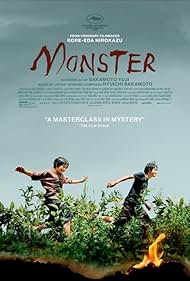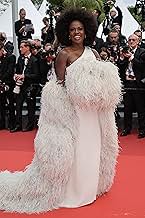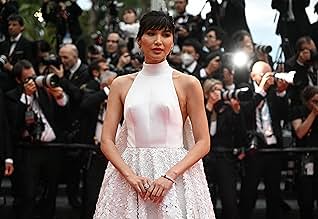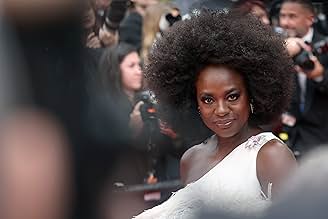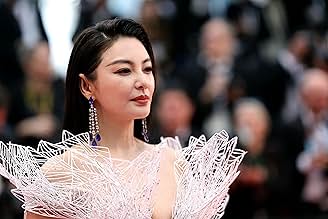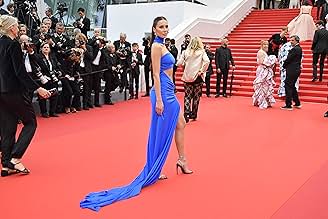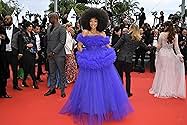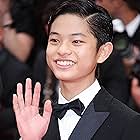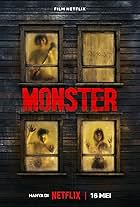A mother demands answers from her son's teacher when her son begins acting strangely.A mother demands answers from her son's teacher when her son begins acting strangely.A mother demands answers from her son's teacher when her son begins acting strangely.
- Awards
- 10 wins & 48 nominations total
- Director
- Writer
- All cast & crew
- Production, box office & more at IMDbPro
Featured reviews
During the initial hour, you may experience a state of complete bewilderment, unsure of the exact themes being portrayed in here. Is it centred around the troubled minds of children, or does it delve into the realms of bullying, abuse, or even something more sinister?
Several questions will plague your mind, regardless of your strong inclination to scrutinise this narrative, you will find little to no clarity due to the intricately crafted script that almost follows a 'Rashomon' structure, presenting different perspectives.
At the outset, your queries will remain unanswered, requiring further patience. However, if you can somehow endure that burden, the film remarkably unravels itself in the concluding moments, connecting every single dot and revealing its ultimate truth underneath.
I must admit, I was blown away by the revelation. The way Hirokazu Koreeda, the director, masterfully navigates through such delicate and complex themes without resorting to any impure contemplations is commendable, to say the very least.
"Monster" has now undoubtedly become my personal favourite from him, even exceeding one of his most acclaimed work, 'Shoplifters'.
P. S. The performances delivered by the two kids, Soya Kurokawa (Minato) and Hinata Hiiragi (Yori), were nothing short of outstanding. The scenes between them never felt superficial, not once, and their maturity, especially considering their young age, deserves nothing but high praise.
Several questions will plague your mind, regardless of your strong inclination to scrutinise this narrative, you will find little to no clarity due to the intricately crafted script that almost follows a 'Rashomon' structure, presenting different perspectives.
At the outset, your queries will remain unanswered, requiring further patience. However, if you can somehow endure that burden, the film remarkably unravels itself in the concluding moments, connecting every single dot and revealing its ultimate truth underneath.
I must admit, I was blown away by the revelation. The way Hirokazu Koreeda, the director, masterfully navigates through such delicate and complex themes without resorting to any impure contemplations is commendable, to say the very least.
"Monster" has now undoubtedly become my personal favourite from him, even exceeding one of his most acclaimed work, 'Shoplifters'.
P. S. The performances delivered by the two kids, Soya Kurokawa (Minato) and Hinata Hiiragi (Yori), were nothing short of outstanding. The scenes between them never felt superficial, not once, and their maturity, especially considering their young age, deserves nothing but high praise.
Ryuichi Sakamoto's music, the precise editing, the great use of anamorphic lenses, the surprisingly dynamic soundscape, the great use of the Ronin 4D compact camera system, Hirokazu's brilliant directing and surprisingly dynamic staging. All of this existed to serve the impeccable performances and the brilliant story.
Yes, it's very much a contemporary piece, made with contemporary gear, set in the present. Still, the story felt timeless. I think that's why comparisons to the classic Rashomon are often made about this film, though I find them incredibly stretched. We are never lied to like we would've been watching Rashomon in this film, we experience the story exactly as the characters experience them.
In a time where meta films like Babylon and Asteroid City are starting to re-examining their own value, and even big blockbusters like Oppenheimer and Dead Reckoning needed to remind a post-COVID audience of their "return to practicality" techniques to bring them to the cinemas, this is the one that truly reminded me of why I go to the movies in the first place.
Lightning in a bottle.
Yes, it's very much a contemporary piece, made with contemporary gear, set in the present. Still, the story felt timeless. I think that's why comparisons to the classic Rashomon are often made about this film, though I find them incredibly stretched. We are never lied to like we would've been watching Rashomon in this film, we experience the story exactly as the characters experience them.
In a time where meta films like Babylon and Asteroid City are starting to re-examining their own value, and even big blockbusters like Oppenheimer and Dead Reckoning needed to remind a post-COVID audience of their "return to practicality" techniques to bring them to the cinemas, this is the one that truly reminded me of why I go to the movies in the first place.
Lightning in a bottle.
A very well constructed film exploring the complexity of how simple words and actions affect people in unexpected ways. Highly relatable in showing how, armed with only a superficial understanding of a person or situation, context can be manufactured to fit a particular narrative. But not only individuals, but institutions as well are put in the crosshairs. The bureaucratic value placed on appearance and propriety (perhaps more particularly in Japanese society but nevertheless universal) is also critiqued.
But the most telling point, and for me the one most central to the story, was what could have been dismissed as a throw-away line. But at its heart, the perfect example of how simple words create a life of their own. It's when the teacher, Mr. Hori, casually, and quite un-seriously, remarks in the PE class about what it is to be a man. At its core, that's what the film is about, understanding who you are as a human, and accepting it on your own terms. Confusion, misinterpretation, familial and societal expectations of how someone must be, or act, or love, can turn them into the other, the strange, the monster. And the film is overflowing with empathy for all those who become afflicted in one way or another.
If the film has one drawback, it's that the editing in the later stages of the film gets a bit loose. The time-jump and multiple perspective structure of the film works magnificently well for most of the film, but nearing the end, it does tend to drag a bit. But overall, a wonderfully engaging and skillfully produced film.
But the most telling point, and for me the one most central to the story, was what could have been dismissed as a throw-away line. But at its heart, the perfect example of how simple words create a life of their own. It's when the teacher, Mr. Hori, casually, and quite un-seriously, remarks in the PE class about what it is to be a man. At its core, that's what the film is about, understanding who you are as a human, and accepting it on your own terms. Confusion, misinterpretation, familial and societal expectations of how someone must be, or act, or love, can turn them into the other, the strange, the monster. And the film is overflowing with empathy for all those who become afflicted in one way or another.
If the film has one drawback, it's that the editing in the later stages of the film gets a bit loose. The time-jump and multiple perspective structure of the film works magnificently well for most of the film, but nearing the end, it does tend to drag a bit. But overall, a wonderfully engaging and skillfully produced film.
I was lucky to catch this at TIFF, and also lucky to see it with the director in attendance.
I really don't think I can write anything eloquent enough to do justice to this film. The story is deceptively simple, told in an ingenious way, with a multidimensional understanding of each and every character. Every minute is crafted with purpose.
At one point near the ending, there's a moment of dialogue between two specific characters. I'm not going to give any details to avoid spoilers. These characters said some simple lines, but these lines were so devastating and emotionally pure that I can hardly describe it. The screenwriter and director made it all look so simple, yet something like this can't easily be replicated or achieved.
And the ending. I left the theatre thinking one thing, and then with more thought, it hit me like a train hours later.
I don't know when this will come to theatres, but I'll be eagerly awaiting its release.
I really don't think I can write anything eloquent enough to do justice to this film. The story is deceptively simple, told in an ingenious way, with a multidimensional understanding of each and every character. Every minute is crafted with purpose.
At one point near the ending, there's a moment of dialogue between two specific characters. I'm not going to give any details to avoid spoilers. These characters said some simple lines, but these lines were so devastating and emotionally pure that I can hardly describe it. The screenwriter and director made it all look so simple, yet something like this can't easily be replicated or achieved.
And the ending. I left the theatre thinking one thing, and then with more thought, it hit me like a train hours later.
I don't know when this will come to theatres, but I'll be eagerly awaiting its release.
The perspective from which we view a situation infallibly provides us with a clear, irrefutable picture of its truthfulness, right? But what happens if we encounter someone who witnesses the same incident and comes away from it with a totally different interpretation? Both views can't be "right," can they? Or is it possible that none of us can see the totality of a scenario and claim to know everything about it? That's the core takeaway from director Kore-eda Hirokazu's latest feature, an ambitious, skillfully crafted tale told from multiple vantage points, all of them "correct" in their own right, despite the myriad differences that distinguish them from one another, a storytelling technique first developed by Japanese master filmmaker Akira Kurosawa in the screen classic "Rashomon" (1950). Kore-eda's cinematic homage to the famed auteur, told in three separate but interconnected segments, focuses on the exploits of a rebellious pre-teen (Soya Kurokawa) seemingly prone to acting out as a bully. The youth's unpredictable behavior, however, doesn't tell the whole story. His actions appear to be cryptically interwoven with those of his overly protective widowed mother (Sakura Ando), his.young middle school teacher (Eita Nagayama), his aging, softspoken principal (Yuko Tanaka), and his effervescent best friend (Hinata Hiiragi), many of whom aren't always what they seem to be. There are forces at work here that are a cause for concern, prompting the often-asked question, "Who is the monster?", a query that provides the inspiration for this film's title. It's intriguing to watch how the picture's various story threads come together, reminding us of the old adage of not judging a book by its cover, poignantly illustrating that, no matter how much we may think we know about a particular situation, there's a good chance we'll never get a complete picture of it. Kore-eda serves up an eye-opening tale, one that gives us pause to think about our impressions and preconceptions in an age when many of us are all too quick to superficially judge what we see - and in a frequently flawed framework at that. The picture could stand to be a little more swiftly paced at times (especially in the final act), but this is arguably the director's best and most sensitive work to date, one that, we can only hope, will have the kind of profound impact we need in an age where open-mindedness and tolerance are traits we could all stand to develop to a much greater degree - particularly when pieces of the puzzle are missing.
Storyline
Did you know
- TriviaKoreeda said that all the characters in the film, to some degree, are imprisoned by invisible walls. "The mother is restricted by social norms, and the teacher is restricted by his manhood, as well as the school system. And the children are living in this world that the adults have created and they are affected by it, in terms of the violence that is perpetrated upon them. Yet they are able to escape it. It's as if the adults have been left behind, and the children have gone ahead and come to their own self-realization. I wanted it to be a positive realization."
- How long is Monster?Powered by Alexa
Details
- Release date
- Country of origin
- Official sites
- Languages
- Also known as
- Quái Vật
- Filming locations
- Kamaguchi Suimon, Nagano, Japan(Sluice Gate)
- Production companies
- See more company credits at IMDbPro
Box office
- Gross US & Canada
- $434,585
- Opening weekend US & Canada
- $25,603
- Nov 26, 2023
- Gross worldwide
- $20,453,866
- Runtime2 hours 7 minutes
- Color
- Sound mix
- Aspect ratio
- 2.39 : 1
Contribute to this page
Suggest an edit or add missing content

